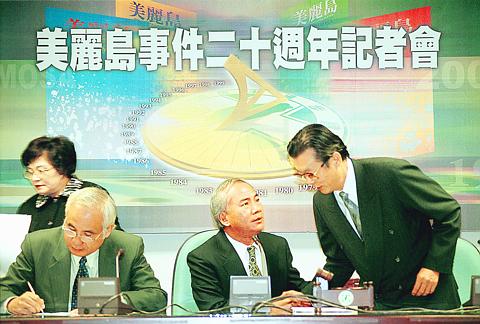While commemorating the 20th anniversary of the Kaohsiung Incident, now recognized as a seminal episode in Taiwan's democratic development, DPP leaders yesterday demanded the government redress the wrongs of those convicted in its aftermath and restore the "historical truth" of the Incident.
DPP legislator Chang Chun-hsiung (張俊雄) -- then a defense lawyer for the opposition politicians charged with sedition over the Incident -- said the government should take action through the legal system, rather than paying mere lip service to the event.
"When [former DPP chairman] Huang Hsin-chieh (黃信介) passed away, President Lee Teng-hui (李登輝) and Vice President Lien Chan (連戰) unanimously praised him for his contribution to Taiwan's democracy. And when some politicians yesterday revisited the prison where they had once been jailed, they were received as honored guests because of their contributions to peaceful reform," Chang said.

PHOTO: GEORGE TSORNG, TAIPEI TIMES
"Nevertheless, in the eyes of the law, these politicians are still convicted seditionists," Chang added.
Huang was sentenced and jailed for sedition over his part in the Incident, along with a group of other opposition activists who later also became key players in the DPP.
The Incident is considered to have ultimately prompted the KMT government to lift a ban on the formation of political parties in the 1980s, which made possible the founding of the DPP.
Chang said it is essential that lessons from the Incident are passed down to the next generation.
"We wish to establish the historical truth to avoid a repetition of such wrongs in the next generation," Chang said.
Chang said some mystery still surrounds the Incident, such as whether it was a trap set by the KMT in its battle against the opposition elite, or whether it was connected with the murder of the mother and two daughters of current DPP Chairman Lin I-hsiung (
"We wonder if these were actions ordered by the KMT to warn people against supporting the opposition movement," Chang said.
Chen Chi-mai (
"The main purpose of the law is to ensure the transparency of government information to facilitate public supervision and to restore the original look of historical incidents," Chen said.
Despite the past injustices and these many mysteries, Lin said the DPP is proud to say that Taiwan is a country today owing to its democratic development over the past two decades.
"Though our democratic system still isn't very stable, though social confrontation and contradictions left over by history remain, and though the justice, harmony and peace that we expected have not reached a perfect state, we now enjoy the right and ability to realize our dreams," Lin said in an official statement issued on behalf of the DPP.
Lin said the DPP hopes to push Taiwan's democracy to maturity through the transfer of power.
Responding to the DPP's demand for redress, high-ranking officials from the Executive Yuan said the government needs some time to study the matter.
The officials added that judicial investigation into the murder of Lin's family and Chen's murder will continue.

DAREDEVIL: Honnold said it had always been a dream of his to climb Taipei 101, while a Netflix producer said the skyscraper was ‘a real icon of this country’ US climber Alex Honnold yesterday took on Taiwan’s tallest building, becoming the first person to scale Taipei 101 without a rope, harness or safety net. Hundreds of spectators gathered at the base of the 101-story skyscraper to watch Honnold, 40, embark on his daredevil feat, which was also broadcast live on Netflix. Dressed in a red T-shirt and yellow custom-made climbing shoes, Honnold swiftly moved up the southeast face of the glass and steel building. At one point, he stepped onto a platform midway up to wave down at fans and onlookers who were taking photos. People watching from inside

A Vietnamese migrant worker yesterday won NT$12 million (US$379,627) on a Lunar New Year scratch card in Kaohsiung as part of Taiwan Lottery Co’s (台灣彩券) “NT$12 Million Grand Fortune” (1200萬大吉利) game. The man was the first top-prize winner of the new game launched on Jan. 6 to mark the Lunar New Year. Three Vietnamese migrant workers visited a Taiwan Lottery shop on Xinyue Street in Kaohsiung’s Gangshan District (崗山), a store representative said. The player bought multiple tickets and, after winning nothing, held the final lottery ticket in one hand and rubbed the store’s statue of the Maitreya Buddha’s belly with the other,

‘NATO-PLUS’: ‘Our strategic partners in the Indo-Pacific are facing increasing aggression by the Chinese Communist Party,’ US Representative Rob Wittman said The US House of Representatives on Monday released its version of the Consolidated Appropriations Act, which includes US$1.15 billion to support security cooperation with Taiwan. The omnibus act, covering US$1.2 trillion of spending, allocates US$1 billion for the Taiwan Security Cooperation Initiative, as well as US$150 million for the replacement of defense articles and reimbursement of defense services provided to Taiwan. The fund allocations were based on the US National Defense Authorization Act for fiscal 2026 that was passed by the US Congress last month and authorized up to US$1 billion to the US Defense Security Cooperation Agency in support of the

‘COMMITTED TO DETERRENCE’: Washington would stand by its allies, but it can only help as much as countries help themselves, Raymond Greene said The US is committed to deterrence in the first island chain, but it should not bear the burden alone, as “freedom is not free,” American Institute in Taiwan Director Raymond Greene said in a speech at the Institute for National Defense and Security Research’s “Strengthening Resilience: Defense as the Engine of Development” seminar in Taipei yesterday. In the speech, titled “Investing Together and a Secure and Prosperous Future,” Greene highlighted the contributions of US President Donald Trump’s administration to Taiwan’s defense efforts, including the establishment of supply chains for drones and autonomous systems, offers of security assistance and the expansion of